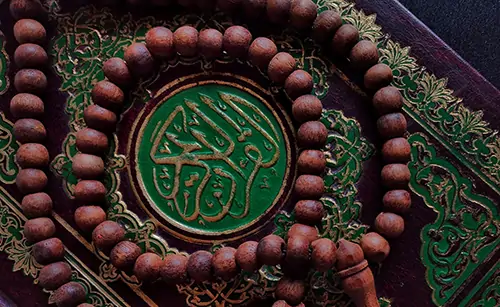How to Make Niyyah for Salah? Intention for Namaz in Islam

Salah, the important part of Muslim life, isn't just a series of physical movements. It's a communion with Allah, a conversation of a creature with his creator. At the heart of this communication lies Niyyah for namaz, the intention of the silent actor that connects our physical actions to the spiritual realm.
This article delves into the essence of Niyyah, knowing its secrets and offering practical guidance on crafting an intention that ignites the spirit and elevates our prayer. Whether you're a seasoned prayer striving for deeper connection or a beginner seeking to navigate the first steps, we are here to help you with the essence of Niyyah.
What is Niyyah in Islam?
Niyyah is intention in Arabic. In Islam, intention is a crucial concept and important before doing any good deed, especially before namaz. But you can say Niyyah is the motive behind certain actions. Niyyah is the only thing distinguishing prayers for Allah (swt) from the ordinary acts of the Duniyah. There is also a hadith by the prophet (PBUH) that I want to quote here:
"The reward of deeds depends upon the intention, and every person will get the reward according to what he has intended. So whoever emigrated for Allah and His Apostle, then his emigration was for Allah and His Apostle. And whoever emigrated for worldly benefits or for a woman to marry was for what he emigrated for." (Sahih Bukhari, Kitab-ul-Imaan, Hadith No. 53)
This is the most simple way to explain the Niyyah. The Niyyah is important for every ibadah for Allah; however, in this article, we'll talk about the Niyyah for namaz.

Why the Niyyah for Salah is important?
Niyyah is the differentiation wall between the different acts of worship for Allah. Like the Niyyah for the fajar prayer and the Niyyah for slaughtering your beloved animal, it will be different. To show how important the Niyyah is here, we quote the saying of the Prophet (PBUH), which Umar bin Al-Khattab narrates.
So, Umar bin Al-Khattab narrates, "I heard Allah SWT's Messenger (PBUH) saying: 'The reward of deeds depends upon the intentions and every person will get the reward according to what he has intended. So whoever emigrated for worldly benefits or for a woman to marry, his emigration was for what he emigrated for.'" (Sahih Bukhari and Muslim)

Now, you know why and how important the Niyyah is in salah, so let's find out the different Niyyah for all the salahs separately.
Niyyah for Salah in Arabic:
Niyyah for Fajr in Arabic:
اُصَلّيْ فَرْضَ الصُّبْحِ رَكَعَتَيْنِ اَدَاءً مُّسْتَقْبِلاً اِلي الكَعْبَةِ الشَّرِيفَةِ لِلهِ اَللهُ اَكْبَرْ
Meaning: "I intend to pray two rak'ah Fard of Subh facing the qibla for Allah, the Great."

Niyyah for Zuhr in Arabic:
اُصَلّيْ فَرْضَ الظُّھَرِ اَرْبَعَ رَكَعاَتٍ اَدَاءً مُّسْتَقْبِلاً اِلي الكَعْبَةِ الشَّرِيفَةِ لِلهِ اَللهُ اَكْبَرْ
Meaning: "I intend to pray four rak'ah Fard of Dhuhar facing the qibla for Allah, the Great."

Niyyah for Asr in Arabic:
اُصَلّيْ فَرْضَ العَصْرِ اَرْبَعَ رَكَعاَتٍ اَدَاءً مُّسْتَقْبِلاً اِلي الكَعْبَةِ الشَّرِيفَةِ لِلهِ اَللهُ اَكْبَرْ
Meaning: "I intend to pray four rak'at Fard of 'Asr facing the qibla for Allah, the Great."

Niyyah for Maghrib in Arabic:
اُصَلّيْ فَرْضَ المَغْرِبِ ثَلاَثَ رَكَعاَتٍ اَدَاءً مُّسْتَقْبِلاً اِلي الكَعْبَةِ الشَّرِيفَةِ لِلهِ اَللهُ اَكْبَرْ
Meaning: "I intend to pray three rak'ah Fard of Maghrib facing the qibla for Allah, the Great."

Niyyah for Isha in Arabic:
اُصَلّيْ فَرْضَ العِشاَءِ اَرْبَعَ رَكَعاَتٍ اَدَاءً مُّسْتَقْبِلاً اِلي الكَعْبَةِ الشَّرِيفَةِ لِلهِ اَللهُ اَكْبَرْ
Meaning: "I intend to pray four rak'at Fard of 'Ishaa facing the qibla for Allah, the Great."

Conclusion
Making Niyyah for salah is not simply uttering memorized words; it's about aligning your heart and actions with the purpose of prayer. It's the conscious decision to devote sincerely to Allah, seeking closeness and submitting to His will. Remember, Niyyah is a matter of the heart, not a mechanical ritual.
By approaching prayer with a pure niyyah (intention), we elevate the experience from mere physical movements to a profound spiritual connection. We dedicate our time and energy to worshipping Allah, seeking His pleasure, and strengthening our relationship with Him. This inner focus enhances our concentration, deepens our humility, and fuels our motivation to follow the Almighty's guidance.

Therefore, let us strive to make Niyyah the cornerstone of our prayers. May our every movement in salah be filled with sincerity, humility, and complete surrender to Allah. In doing so, we may indeed find the immense spiritual reward promised to those who stand before Him with devotion and true reverence. INSHALLAH!
FAQ's
What’s the Niyyah for Gusl?
Ghusl is a ritual Muslims perform to purify their body. It is very important to clean your body and go to the gym every Friday. However, there is a difference of opinion when it comes to the Niyyah of gusl. One school of thought says it is mandatory to say bismillah before gusl, while the other thinks it is not compulsory and you don't need to utter such words in the bathroom. So, you can follow any school of thought according to your understanding.
What’s the Niyyah for Hajj and Umrah?
لَبَّيْكَ اللَّهُمَّ عُمْرَةً وَ حَجًّا
اللَّهُمَّ إِنِّيْ أُرِيْدُ الْعُمْرَةَ وَ الْحَجَّ
اللَّهُمَّ إِنِّيْ أُرِيْدُ الْعُمْرَةَ وَ الْحَجَّ فَيَسِّرْهُمَا لِيْ وَتَقَبَّلْهُمَا مِنِّيْ
Translation: Labbayk Allahumma Umratan wa Hajj.
What's the Niyyah for fast?
وَبِصَوْمِ غَدٍ نَّوَيْتُ مِنْ شَهْرِ رَمَضَانَ
Translation: I intend to keep the fast for tomorrow during Ramadan.
Why Is It Mandatory to Make Intention Before Doing Wudu?
Wudu is very important in Islam to purify your soul before salah. There is a difference of opinion on these points in different schools of thought. However, we'll share the point of every school of thought so you can follow the school of thought you come from. In the Maliki, Shafi'i, and Hanbali schools of thought, the Niyyah before doing wudu is compulsory, and your wudu will only be valid with the intention. In the Hanafi school of thought, the Niyyah is not mandatory for the validity of wudu.














